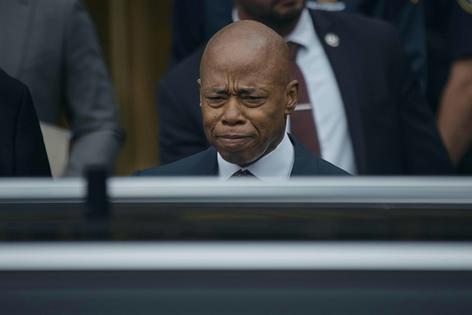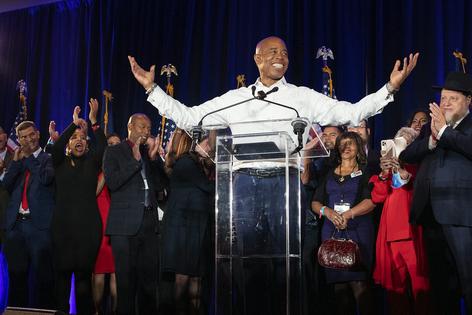NYC’s ‘Eric Adams Show’ heads for a final curtain, with echoes of another New Yorker more focused on style than policy
Published in Political News
As the Democratic primary for mayor in New York approached in the spring of 2021, most of my friends and colleagues were supporting one of three candidates.
My lefty friends were all rallying around progressive standard-bearer Maya Wiley. My more middle-of-the-road friends were supporting Kathryn Garcia, who ran on a platform that promised excellent management while deemphasizing ideology. A fair number of my friends, particularly insiders who regularly did business with the city, were hoping Eric Adams would be the next mayor.
When I asked the Adams supporters why he was their choice, almost all of them said a version of “We know we can do business with him.” Well, that is certainly one way to put it.
Adams is now facing a five-count indictment that could lead to the end of his political career, or perhaps more dire consequences, in large part because of the people with whom he chose to do business.
Adams has crafted a political persona that may help explain how he found himself in this position.
Adams, New York City’s second Black mayor, won the hotly contested Democratic primary in 2021 by building a coalition that began with consolidating the Black vote. He then pivoted right to win support from more religious Jews and other conservative white voters, primarily outside the borough of Manhattan. You might call this the coalition of those who don’t care what the reliably liberal and sometimes preachy editorial page of The New York Times says.
During the primary, Adams, a former captain in the New York Police Department, exaggerated the crime problem in New York to help deliver the kind of tough-on-crime message that always resonates with conservative white voters, even in a Democratic primary in New York.
In the spring of 2021, when educated liberals fretted about issues such as climate change, threats to democracy and expanding LGBTQ rights, Adams ignored these Democratic Party donor-class concerns and ran what was essentially a law-and-order campaign.
What wasn’t part of the Adams pitch: issues of smart budget management, police reform, innovative solutions to problems, climate change and the academic resumes of the candidates, the kind of topics that a significant chunk of New York primary voters care a lot about.
Adams began his term with some impressive political assets. New York is made up of five boroughs: Manhattan, Brooklyn, the Bronx, Queens and Staten Island, representing a variety of political identities. Adams was an African American who, unlike almost any other African American citywide candidate before, appealed to white voters outside of Manhattan who had previously supported more conservative candidates.
Adams had a great personal story that included growing up at times one step ahead of homelessness and then becoming a New York City police officer who, early in his career, helped combat police brutality. The new mayor was a handsome man with a great smile, and he was a vegan, sort of, to boot.
As a political scientist and longtime political analyst of contemporary politics, I believe Adams could have carved out a meaningful anti-elite mayoralty by prioritizing the needs of his voters and marrying support for the police with programs to help lower-income and working New Yorkers.
But from the beginning of his term in office, Adams moved in another direction.
Early in his term, Adams boasted of returning swagger, a quality not generally seen as pertinent to the daunting task of governing New York City, to the mayor’s office. “When a mayor has swagger, the city has swagger,” he said. Adams also claimed to be the face of the future of the Democratic Party while making no secret of hopes of running for president.
There is nothing wrong with a mayor being ambitious or having a little swagger. Willie Brown was a transformative mayor of San Francisco who at 90 still has a bit of swagger.
But swagger alone is not enough to be an effective mayor.
As mayor, Adams failed to address any of the major problems facing the city, while taking extremely hawkish positions on everything from mental illness to protesters at Columbia University, where I teach.
Ultimately, Adams’ disdain for the Manhattan elites led him to a place where, just recently, he continued to defend police officers who shot their guns at a suspect in a crowded subway station and badly injured innocent bystanders.
There is something about Adams that is reminiscent of another prominent politician who grew up in Queens and is not unfamiliar with indictments. Adams’ anti-elitist messaging and constant overstating of the crime problem for political gain are right out of the MAGA and Trump playbook.
In addition, it has always seemed as if Adams’ attention has not been focused on governing, but rather with the idea that he is the star of the “Eric Adams Show.” His mayoralty seemed to be more focused on where he ate and clubs he visited rather than how he addressed policy challenges.
Adams has argued that by going to nightclubs he is providing important help to the local economy, telling the New York Post, “My nightlife is a multi-bilion dollar industry.” He held court at La Bala, a tony restaurant he’d frequent, sometimes more than 20 nights a month.
Adams’ comments – such as, “I am mayor because God gave me the authority to be mayor,” or “Thirty-something years ago I woke up, out of my sleep in a cold sweat. God spoke to my heart and said, ‘You are going to be the mayor January 1, 2022’” – are not simply strange, they suggest a view of himself as a divine messenger rather than a public servant. It also suggests that he views himself as accountable only to a higher power rather than the people he represents and to the laws that apply to all. Donald Trump is a cult-like leader of a much larger and more dangerous scale, but the similarity is there.
New York’s mayor is facing pressure to resign from many within his own party, but he has made it clear he has no intention of doing that, at least for now.
If he manages to stay in office, Adams will face tough opposition in his bid for reelection next year. Of his many potential opponents, the strongest is probably Brad Lander, New York City’s comptroller, who has a reputation as a smart progressive who has never had even the whiff of corruption around him.
New Yorkers have seen almost three full years of the Eric Adams Show, and the latest plot twist may not have been a surprise. But it sure looks like it could lead to the end of the show’s run.
This article is republished from The Conversation, a nonprofit, independent news organization bringing you facts and trustworthy analysis to help you make sense of our complex world. It was written by: Lincoln Mitchell, Columbia University
Read more:
Eric Adams indictment: How campaign finance violations often grow into dramatic scandals
12 New Yorkers convicted Trump − but he never fully fit in to New York City
How San Francisco’s Democratic political machine led to Kamala Harris’ presidential campaign
Lincoln Mitchell does not work for, consult, own shares in or receive funding from any company or organization that would benefit from this article, and has disclosed no relevant affiliations beyond their academic appointment.
































































Comments